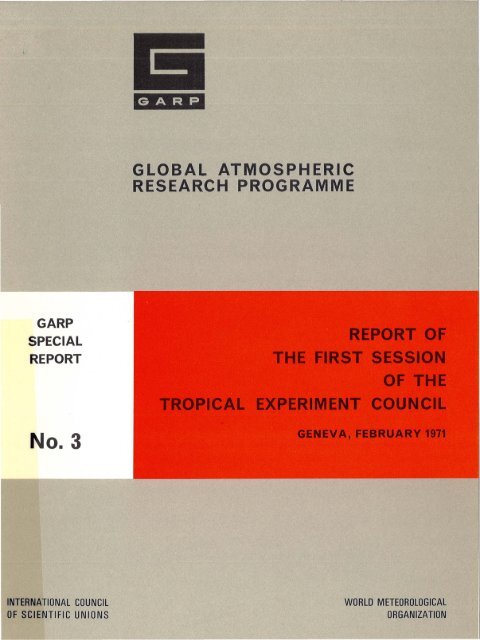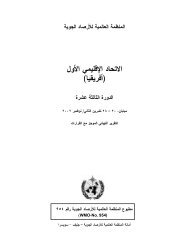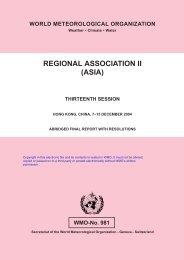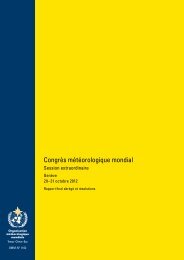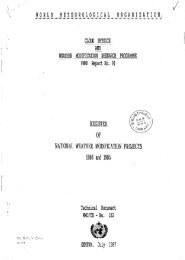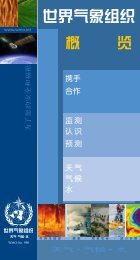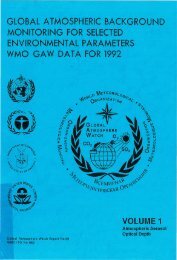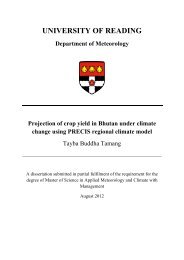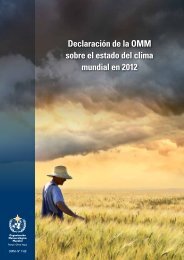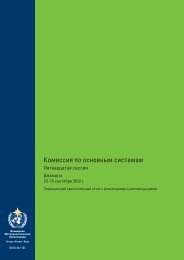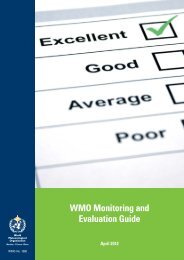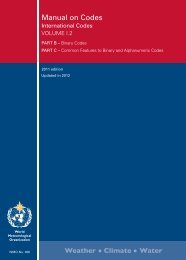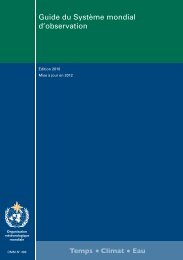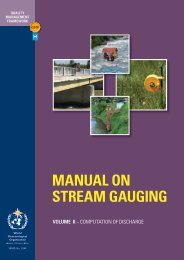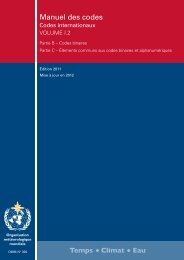global atmospheric research programme - E-Library - WMO
global atmospheric research programme - E-Library - WMO
global atmospheric research programme - E-Library - WMO
- No tags were found...
Create successful ePaper yourself
Turn your PDF publications into a flip-book with our unique Google optimized e-Paper software.
GARP<br />
. GLOBAL ATMOSPHERIC<br />
RESEARCH PROGRAMME<br />
GARP<br />
SPECIAL<br />
REPORT<br />
No.3<br />
INTERNATIONAL COUNCIL<br />
OF SCIENTIFIC UNIONS<br />
WORLD METEOROLOGICAL<br />
ORGANIZATION
c·-<br />
". --,<br />
L'<br />
GLOBAL ATMOSPHERIC RESEARCH<br />
PROGRAMME (GARP)<br />
REPORT<br />
OF THE FIRST SESSION<br />
OF THE<br />
TROPICAL EXPERIMENT COUNCIL<br />
Geneva, February 1971<br />
GARP SPECIAL REPORT No. 3<br />
MARCH 1971
I<br />
\<br />
02'- 4· 8S '~f'<br />
C''L<br />
The designations employed and the presentation of the material in this publication do not<br />
imply the expression of any opinion whatsoever on the part of the Secretariat of the W orId<br />
Meteorological Organization concerning the legal status of any country or territory or of its<br />
authorities, or concerning the delimitation of its frontiers.<br />
© 1971, World Meteorological Organization<br />
International Council of Scientific Unions
FOR E W0 R D<br />
This publication, the third in the series of GARP Special Reports,<br />
contains the report of the first session of the Tropical Experiment Council of the<br />
GARP Atlantic Tropical Experiment, held in Geneva from 17-19 February 1971. Invitations<br />
to the session were sent out by the Secretary-General of <strong>WMO</strong> on behalf of<br />
<strong>WMO</strong> and the International Council of Scientific Unions (ICSU).<br />
The Tropical Experiment Council was established by <strong>WMO</strong> and ICSU. It<br />
is composed of the officially designated representatives of Member governments<br />
whose territories or territorial waters extend into the region of the Atlantic<br />
Tropical Experiment and all other Member governments wishing to participate in the<br />
Experiment. The Council's functions are to review progress in the planning of the<br />
Experiment, to pay special attention to the ways in which the World Weather Watch<br />
operational facilities may be enhanced so as to provide the maximum contribution<br />
to the Experiment and to consider how the results of the Experiment can be best<br />
utilized for the development of meteorological <strong>research</strong> and the improvement of<br />
meteorological applications in the area of the Experiment.<br />
Apart from minor editorial changes, the report contained herein is in<br />
the form approved by the Tropical Experiment Council. The results of the first<br />
session of the Tropical Experiment Council were reviewed by the Tropical Experiment<br />
Board at its first session in Geneva (22-24 February 1971), and will be considered<br />
in due course by competent bodies of <strong>WMO</strong> and ICSU.<br />
I wish to express my appreciation for the co-operative spirit and<br />
interest exhibited by all the delegates to the first session of the Council. The<br />
report of the session clearly shows that the delegates fully recognized that this<br />
co-operation and interest must be maintained, and that the enthusiastic participation<br />
of all interested Members is required if the substantial benefits which could<br />
result from the successful completion of the GARP Atlantic Tropical Experiment are<br />
to be realized.<br />
.<br />
~.<br />
. .<br />
(D. A.<br />
Davies)<br />
Secretary-General<br />
World Meteorological Organization
CON TEN T S<br />
1.<br />
ORGANIZATION OF THE SESSION<br />
Page<br />
1<br />
1.1 Opening of the seSSl.on 1<br />
1.2 Election of the chairman 2<br />
1.3 Approval of the agenda 2<br />
1.4 Working arrangements . . . . 2<br />
2.<br />
APPROVAL OF THE<br />
REGULATIONS OF THE TEC<br />
2<br />
2.1<br />
2.2<br />
2.3<br />
2.4<br />
Review of regulations<br />
Approving authorities<br />
Functions<br />
Approval<br />
2<br />
2<br />
3<br />
3<br />
3.<br />
3.1<br />
3.2<br />
3.3<br />
REVIEW OF GENERAL PLAN FOR THE GARP ATLANTIC TROPICAL EXPERIMENT<br />
Background<br />
JOC recommendations<br />
Council decisions<br />
3<br />
3<br />
4<br />
6<br />
4.<br />
4.1<br />
WORLD WEATHER WATCH AND GATE<br />
Importance of World Weather Watch for GATE<br />
6<br />
6<br />
4.2<br />
WWW<br />
upper-air stations<br />
6<br />
4.3<br />
Possible contributions to the Experiment<br />
7
VI<br />
CONTENTS<br />
4.4 Special requirements for the WWW upper-air network<br />
4.5 Augmentation of the WWW observing networks<br />
4.6 WWW telecommunications and the GATE<br />
8<br />
8<br />
8<br />
5. BENEFITS IN NATIONAL AND REGIONAL OPERATIONS FROM THE GATE DATA<br />
AND RESULTS . . . . . .. •••..•. . . . . . . .<br />
5.1 Some benefits for national and regional activities<br />
5.2 Real-time analysis and prognosis<br />
5.3 Discussion<br />
9<br />
9<br />
9<br />
9<br />
6.<br />
ASSOCIATED NATIONAL AND<br />
REGIONAL RESEARCH ACTIVITIES<br />
. . . . . . . . . . 10<br />
6.1<br />
Recommendations<br />
10<br />
6.2 Recommended stations •<br />
6.3 Climatological material<br />
6.4 Supplementary cloud and weather observations<br />
6.5 Priorities<br />
6.6 Additional stations<br />
6.7 Second sounding per day<br />
6.8 Council's support<br />
10<br />
11<br />
11<br />
11<br />
12<br />
12<br />
12<br />
7. OPPORTUNITIES FOR SPECIAL TRAINING AND PARTICIPATION<br />
IN THE GATE • . • . . • . • • . • . • • • • • • . . . . . . . . . . 12<br />
7.1 Special training . . . . . . . . . . . . . . . . 12<br />
7.2 International fellowships and direct participation 14
CONTENTS<br />
VII<br />
8.<br />
ADDITIONAL REGIONAL AND<br />
NATIONAL ACTIVITIES<br />
15<br />
8.1 Report from ICSU representative . . . . . · · . . · · ·<br />
15<br />
·<br />
8.2 Recommendations of COSPAR Working Group 6 . · · . 15<br />
8.3 Report from IOC representative . 15<br />
8.4 CICAR meeting in Trinidad 15<br />
8.5 Appreciation of Council<br />
· · ·<br />
15<br />
·<br />
8.6 Available facilities . . . . . . . · · · · · ·<br />
16<br />
9.<br />
REPORT OF THE<br />
SESSION<br />
16<br />
10<br />
DATE AND PLACE OF NEXT SESSION<br />
16<br />
ANNEXES<br />
I.<br />
II.<br />
Ill.<br />
IV.<br />
List of participants . • • • . • . • • • • • . • • • • • • • • • • • • •<br />
Agenda<br />
Regulations applicable to the Tropical Experiment Council<br />
Some benefits for national and regional activities from the<br />
forecasting aspects of the GATE . • • . • . . . • • . • . .<br />
17<br />
19<br />
20<br />
22
REPORT OF THE SESSION<br />
1. ORGANIZATION OF THE SESSION<br />
1.1 Opening of the session<br />
1.1.1 The first session of the GARP Tropical Experiment Council was opened at<br />
10.30 a.m. on 17 February 1971 at the <strong>WMO</strong> Headquarters in Geneva by Dr. A. Nyberg,<br />
President of <strong>WMO</strong>,<br />
in the presence of Dr. D. A. Davies, Secretary-General of <strong>WMO</strong>.<br />
Dr. Nyberg welcomed all the participants to the session and referred especially to<br />
the presence of Professor F. A. Stafleu, Secretary-General of the International<br />
Council of Scientific Unions (ICSU) and Dr. T. Malone, Vice-President of ICSU.<br />
Dr. Nyberg reviewed the events which had led up to the convening of the session, with<br />
a special mention of the Planning Conference on GARP held in Brussels in March 1970<br />
and of the session of the Interim Planning Group of the GARP Tropical Experiment held<br />
in London in July 1970. He called attention to the benefits which would result from<br />
the GARP Tropical Atlantic Experiment, both for <strong>research</strong> purposes and for the practical<br />
applications of meteorology;<br />
he felt that the experiment would help in the<br />
further development of Meteorological Services in the area, and in attracting young<br />
scientists to problems of tropical meteorology.<br />
IL conclusion, Dr. Nyberg referred<br />
to the various ways in which countries could contribute to the Experiment and eocpressed<br />
his confidence that Members and international organizations concerned would<br />
provide the necessary support to ensure the success of the experiment.<br />
1.1.2 Professor F. A. Stafleu then addressed the participants on behalf of rcsu<br />
and indicated his organization's willingness to collaborate further with \iMO<br />
in the<br />
GARP Tropical Atlantic Experiment which he considered to be an important and ambitious<br />
project. He mentioned that Dr. T. Malone had been designated by the President of rcsu<br />
as the liaison officer for GARP.<br />
1.1.3 Dr. T. Malone then addressed the session. He considered that the GARP<br />
Tropical Atlantic Experiment represented a great step forward in meteorology, which<br />
had been made possible by the development of new obserYing capabilities and by the<br />
introduction of powerful electronic computers.<br />
He referred to the growing worldwide<br />
concern over the deterioration of the human environment and expressed the view that<br />
meteorologists could serve as pioneers in transforming some of the abstract ideas in<br />
this field into a rational attack on some of the major environmental problems.<br />
Dr. Malone believed that the experiment was one of the most difficult and complex<br />
scientific undertakings ever attempted and that it could be tackled successfully thanks<br />
to the excellent co-operation which had been developed between W~O and ICSU. He reported<br />
that the President of ICSU intended to urge all the adhering members of ICSU<br />
to contribute to the maximum extent possible to GARP.
2<br />
The list of participants is reproduced in Annex I.<br />
1.2 Election of the chairman<br />
Mr. L. Facy, the principal delegate of France, was unanimously elected to<br />
serve as chairman of the session. Dr. M. Seck was later elected to serve as chairman<br />
of the Tropical Experiment Council until its next session.<br />
1.3 Approval of the agenda<br />
The approved agenda is reproduced in Annex 11.<br />
1.4 Working arrangements<br />
The business of the first sess~on<br />
in plenary meetings.<br />
of the Council was conducted entirely<br />
2. APPROVAL OF THE REGULATIONS OF THE TEe<br />
2.1 Review of regulations<br />
The session reviewed the provisional regulations applicable to the Tropical<br />
Experiment Council which had been approved by the Executive Committees of vrMO and<br />
ICSU on the understanding that the TEC would give final approval to its own regulations.<br />
2.2 Approving authorities<br />
vTith regard to the regulations under the title "Approving Authorities", it<br />
was felt that it would be useful to specify which bodies of <strong>WMO</strong> and ICSU should be<br />
responsible for approving the regulations and making any amendments. It was decided·<br />
to propose that this responsibility should be given to the Executive Committees of<br />
the two organizations.<br />
The representative of the U.S.S.R. reserved his position on this proposal<br />
as he considered that it was unnecessary to specify that the Executive Committees<br />
should be responsible for these matters. He considered that in accordance with the<br />
<strong>WMO</strong> Convention and Regulations the Congress had full authority to act on behalf of<br />
<strong>WMO</strong> while in session and that the Executive Committee of <strong>WMO</strong> could act on behalf<br />
of vrMO in between sessions of Congress. Furthermore, the President could take<br />
decisions on behalf of the Executive Committee in between sessions of this Obmmittee.<br />
He thought it would be preferable to leave the wording of the TEC regulations<br />
unchangecl.
3<br />
2.3 Functions<br />
Under the heading "Functions", the session felt that it would be preferable<br />
to introduce some flexibility regarding the chairman of the Tropical Experiment<br />
Council by making provision for the election of a chairman to serve only for the duration<br />
of a session. It was agreed that this could be taken care of by stating that<br />
"At the opening of each session the Tropical Experiment Council will elect from its<br />
members a chairman who will normally continue to serve in that capacity during the<br />
session and thereafter until the next session".<br />
2.4 Approval<br />
Subject to these two proposed amendments, the regulations applicable to the<br />
Tropical Experiment Council were approved. The full text of the regulations, which<br />
will be considered by the Executive Committees of <strong>WMO</strong> and ICSU, is reproduced ~n<br />
Annex Ill.<br />
3. REVIEW OF GENERAL PLAN FOR THE GARP TROPICAL ATLANTIC EXPERIMENT<br />
3.1 Background<br />
3.1.1 A detailed description of the GARP Tropical Sub-<strong>programme</strong> was presented for<br />
the first time in January 1970 ("The Planning of GARP Tropical Experiments", GARP<br />
Publication Series No. 4). In this report it was emphasized that the understanding<br />
and modelling of physical and dynamical systems were required for long-range weather<br />
prediction and it was especially pointed out that there are many unresolved problems<br />
in regard to the tropical atmosphere. At the time when this report was published,<br />
the plan was to carry out the tropical experiment in the Pacific Ocean.<br />
3.1.2 In March 1970 an international conference on GARP was held in Brussels.<br />
During this conference it became clear that the participating countries preferred the<br />
Atlantic Ocean for the first tropical experiment. It was indicated in the report of<br />
this conference (Report of the Planning Conference on GARP, GARP Special Report No. 1),<br />
that such an experiment "would be of great scientific value and technically feasible".<br />
3.1.3 In June 1970 the Joint Organizing Committee (JOC) had its fourth session in<br />
Moscow. The discussion on this matter led to the conclusion that most of the objectives<br />
of the tropical experiment could be achieved by carrying out the experiment ~n<br />
the Atlantic. A "Supplement to GARP Publication Series No. 4" was presented.<br />
3.1.4 In July 1970 an interim planning group on the tropical experiment met in<br />
London. This group agreed on a plan of action for the tropical experiment. It was<br />
suggested that two bodies should be created for the management of this experiment:<br />
The Tropical Experiment Council (TEC), consisting of representatives of Members within<br />
the territory of the experiment and of other interested Members, and the Tropical<br />
Experiment Board (TEB), consisting mainly of representatives of Members making substantial<br />
contributions to the conduct of the experiment. It was also recommended that<br />
the Tropical Experiment Board should form a Scientific and Management Group (SMG) which<br />
should prepare a detailed plan for the conduct of the experiment. In order to avoid<br />
delay in the planning work, it was further recommended that an Interim Scientific
4<br />
and Management Group (ISMG) should start the planning work before the formal establishment<br />
of the TEB and its sub-body, the SMG. The "Report of the Interim Planning Group.<br />
on GARP Tropical Experiment in the Atlantic" was published as GARP Special Report No. 2.<br />
3.1.5 In September/October 1970 the Executive Committees of· ICSU and <strong>WMO</strong> approved:<br />
(i)<br />
(ii)<br />
(Hi)<br />
The plan to establish the bodies TEC and TEB;<br />
That the ISMG<br />
as possible;<br />
should be formed and start the planning work as soon<br />
and<br />
That the general area of the experiment in which the large-scale<br />
motion would be observed should be bounded approximately by the<br />
meridians 400E and 900W and the parallels 1005 and 200N.<br />
3.1.6 In November 1970, the ISMG started the planning work, in close conjunction<br />
with the Director and members of the Joint Planning Staff for GARP and with the<br />
<strong>WMO</strong> Secretariat. At present, the ISMG consists of the following three persons:<br />
Dr. J.P. Kuettner (U.S.A.), Dr. N.E. Rider (U.K.) and Dr. I.G. Sitnikov (U.S.S.R.).<br />
Considerable time was also spent with the ISMG by the following participants:<br />
Dr. M. Dunst (Federal Republic of Germany), Mr. M. Tavares (Portugal),<br />
Mr. J.P. Labarthe (France), Miss F. Cruz (Portugal), Dr. N. LaSeur (U.S.A.) and<br />
Mr. D. Seeko (U.S.A.). The ISMG has produced several documents within the different<br />
fields of interest for the detailed design of the tropical experiment. Some of these<br />
were presented to the TEC while others will be presented to the TEB.<br />
3.1.7 In January 1971 the JOC Study Group on Tropical Disturbances met in Geneva<br />
and made specific recommendations regarding the aims of the experiment and the choice<br />
of the area within which more intensive observations should be undertaken (this area<br />
of more intensive observations is called the B-scale area).<br />
3.2 JOC recommendations<br />
The fifth session of JOC was held at Bombay from 1-5 February 1971 and during<br />
that session several recommendations were made concerning the tropical experiment.<br />
Although these recommendations had not been finally approved by JOC, they were summarized<br />
to the TEC as follows:<br />
3.2.1 The experiment should be named the GARP Atlantic Tropical Experiment (GATE);<br />
.3.2.2 In as much as GATE or any single tropical experiment cannot be expected to<br />
solve all problems in the tropics of importance to GARP, GATE should be focussed on<br />
the study of physical properties of cloud clusters in the Atlantic that will contribute<br />
to our understanding of the phenomena and therefore increase our ability to<br />
account for them adequately in the numerical simulation of the general circulation<br />
of the <strong>global</strong> atmosphere.<br />
3.2.3<br />
studies<br />
used in<br />
The experiment should be designed in such a way as to allow for special<br />
on energy interactions between all scales of motion. Within the terminology<br />
previous reports, it should be a combined type I/type 11 experiment.
5<br />
3.2.4 The B-scale observations of GATE should, as a first priority, be carried out<br />
in an area in the Eastern Atlantic (50 N to 15 0 N, 23 0 Wto 30 0 W). It seems unlikely<br />
that there will be sufficient logistic resources to permit simultaneous observations<br />
in both an east and a west area. However, it does appear that the time required for<br />
completion of the necessary observations in the eastern section may be somewhat<br />
shorter than the three months tentatively planned for the duration of the GATE.<br />
Consequently, it may be possible to implement a second observing period in the west<br />
(lOON to 20 0 N, 47°W to 54 0 W), but JOG defers to the SMG the evaluation of the feasibility<br />
of such a plan.<br />
3.2.5 1974 should be set for the time of the GATE. Any earlier date would pose<br />
logistics difficulties and any later date would be too close to the First GARP Global<br />
Experiment, which is recommended for implementation beginning in 1976. The months of<br />
June, July and August are recommended for the period, possibly extending into early<br />
September.<br />
3.2.6 The availability of a geostationary satellite over the area was considered<br />
to be an indispensable condition for the GATE. The satellite should at least have<br />
day-time cloud-imaging capability. Provision of infra-red cloud-imaging capability<br />
in addition will immeasurably enhance the operational and scientific aspects of the<br />
experiment.<br />
3.2.7 The possibility of providing infra-red vertical soundings of temperature<br />
from a geostationary satellite should be explored.<br />
3.2.8 The oceanographic/meteorological ships to be used for the B-scale area must<br />
be equipped with rawinsonde systems and should also include radars calibrated for<br />
reflectivity measurements so that indications of rainfall regions and amount may be<br />
obtained.<br />
3.2.9 The B-scale ships should also have observing capability related to obtaining<br />
the vertical fluxes of heat, water vapour and momentum throughout the boundary laye~<br />
on the B-scale, ~nd in particular~~ugh the A-scale disturbances as they move through<br />
the B-scale area. It is desirable to determine the pattern of these fluxes on the<br />
scale of the cloud clusters.<br />
3.2.10 Radiation measurements should be taken on the B-scale (i) at the surface,<br />
(ii) within the atmosphere by aircraft, radiometer,sondes, tethered balloons, etc.,<br />
and especially over the tops of active convective systems, and (iii) at the top of<br />
the atmosphere by satellites.<br />
3.2.11 Adequate observations must be obtained on the C- and D-scales. It appears<br />
that instrumented aircraft are the major observing tool here. It also seems that the<br />
number of aircraft tentatively pledged as of now will be inadequate in number to<br />
sample enough convective systems in the B-scale.<br />
3.2.12 Polar-orbiting satellites should provide observations of the sea-surface<br />
temperature to at least 10C, better if possible. JOC requested one of its members<br />
to undertake a brief survey of what is now known about the diurnal variation and<br />
time and size spectra of anomalie. of sea-surface temperature to assist in setting<br />
a realistic accuracy requirement.
6<br />
3.2.13 Some real time, or quasi-real time, processing of data, especially on the<br />
A-scale but probably including selected B-scale data, will be needed for efficient<br />
operational planning on a day-to-day basis, as well as providing.a quick-look<br />
capability to the various data fields to identify any problems that may be necessary<br />
to correct in the final processing.<br />
3.2.14 The TEB should consider the feasibility of arranging for a trial observation<br />
period in the year preceding the GATE.<br />
3.2.15 The TEB/SMG should, in accordance with the proposed regulations, establish<br />
easy and quick communication mechanisms with JOG, via the JPS, so that JOC can fulfil<br />
its obligations to keep under review the planning so as to assure that the scientific<br />
objectives will be met. For its part, JOG authorized three of its members to act<br />
individually, as appropriate, on behalf of JOG in responding to any query from TEB/SMG<br />
with regard to any matter that might arise in planning that could jeopardize the meeting<br />
of the scientific objectives, or that may on the other hand improve the scientific<br />
possibilities of the GATE.<br />
3.3 Council decisions<br />
The Council noted with interest the various proposals reported above and<br />
understood that they would be studied further by the TEB. It was in particular agreed<br />
that the GATE should take place in the area mentioned in paragraph 3.1.5 (iii). The<br />
Council also noted the recommendation concerning the areas for the B-scale observations<br />
(see paragraph 3.2.4).<br />
4.. WORLD WEATHER WATCH AND GATE<br />
4.1 Importance of World Weather Watch for GATE<br />
The Council stressed that one of the most important contribution5 to the<br />
experiment would be the complete implementation of the land-based stations and observational<br />
<strong>programme</strong>s of WWW within the area of the experiment. The Council urged that<br />
Members of <strong>WMO</strong> should continue to make all possible contributions to VAP with this<br />
purpose in mind. It was agreed that any action which Sixth Congress might take to<br />
assist wherever necessary in the implementation of these <strong>programme</strong>s would be of<br />
paramount value for the success of the experi~ent. The experiment will bring benefits<br />
to all countries through improvements in our scientific and technological knowledge<br />
in the field of meteorology. The Council accordingly discussed various aspects<br />
of the present stage of implementation of the WWW and of the future WWW plans on the<br />
understanding that these questions would be reviewed in more detail by the TEB.<br />
4.2 WWW upper-air stations<br />
4.2.1 The problem of compatibility of upper-air instrumentation was recognized<br />
as being both important and difficult. It was pointed out that radiosonde differences<br />
and errors must be made smaller than the variation produced by the disturbances to be<br />
detected on the A scale. Individual Members will need to assess the functioning of<br />
their upper-air systems from this point of view. Support for expansion of coverage<br />
and number of observations may be available from the <strong>WMO</strong> Voluntary Assistance Programme<br />
(VAP) and, possibly, other sources.
1<br />
4.2.2 The survey requested by the president of CIMO, to identify the location<br />
and types of upper-air stations scheduled to be operational at the time of the experiment,<br />
and the equipment and data reduction techniques to be used, was strongly endorsed.<br />
The Secretary-General of WHO, in conjunctio~ 1vith the TEB, was requested to<br />
arrange for a survey to be carried Oilt in order to elicit related iriformation on such<br />
subjects as costs of operation, manpower requirements, equipment reliability and data<br />
accuracy to assist in the further development of upper-air networks.<br />
4.2.3 A report from the Joint Planning Staff had indicated that, in the area of<br />
the Experiment, augmentation of the World Weather Watch Global Observation System.<br />
and possibly more reliable functioning of the Global Telecommunication System, would<br />
be requirai to~ the success of the GATE. In addition, the report stated that improved<br />
collection of data from merchant ships and commercial aircraft would be necessary.<br />
In this connexion, it was suggested that a test, or series of tests, of collection of<br />
such data be performed by Members in anticipation of GATE to assist in development<br />
of the data collection facility. It was further suggested that consideration be given<br />
to the establishment of temporary simple stations for wind only using the new Omegasonde<br />
technique.<br />
4.3 Possible contributions to the Experiment<br />
4.3.1 It was reported that the Caribbean Meteorological Council had endorsed the<br />
establishment of observation and communication systems to complete the WWW network in<br />
the Caribbean, to assure its operation at night, and to perform twice daily upper-air<br />
observations. However, it was noted that the upper-air stations at Timehri (Guyana)<br />
and Belize) (British Honduras) cannot be implemented until VAP or bilateral support<br />
is forthcoming. In addition, it was indicated that the services of the Caribbean<br />
Meteorological Institute and possibly the use of base facilities might be made available<br />
for GATE. .<br />
4.3.2 It was pointed out that iiMO support would be desirable in justifying twice<br />
daily upper-air soundings for Brazil and that assistance may be required to implement<br />
these. The Council noted that a C-130 aircraft equipped for dropsonde observations<br />
may be provided by Brazil but that assistance may be needed to further equip and<br />
operate the aircraft.<br />
4.3.3 It was reported that Finland was considering the 6stablishment of a rawinsonde<br />
station for GATE; a final decision is expected after the end of 1911. Finland<br />
has already contributed six rawinsonde and one APT station through the VAP or by bilateral<br />
agreements and plans further constributions to the VAP.<br />
4.3.4 It was confirmed that the Federal Republic of Germany intended to supply<br />
one or two <strong>research</strong> ships and might establish and operate a temporary rawinsonde<br />
station and radiosonde observations from merchant shins ill support of GATE. In addition,<br />
significant oontributions through certain university institutions are expected.<br />
4.3.5 The representative of Kenya, Tanzania and Uganda stated that these countries<br />
are prepared to take an active part in the GATE. The services of additional planned<br />
telecommunication links should be available for the transmission of data required for<br />
GATE. An additional rawinsonde station will be added, and the present schedule of<br />
two soundings per day maintained.<br />
4.3.6 The repreeentative of Mali confirmed the support to be provided by his<br />
nation to GAT~. He pointed out that the provisional priorities suggested by the ISMG<br />
do not necessarily conform to those established by the Regional Association for WWW<br />
planning purposes, so that co-ordination is required before final priorities can be<br />
established.
8<br />
4.3.7 The representative of the Netherlands indicated that a rawinsonde station<br />
is scheduled at Curayao and that a radar wind station at Paramaribo is probable. The<br />
contribution of a re~earch ship by the Netherlands was also being considered.<br />
4.3.8 The representative of Niger pointed out that, while his Government supports<br />
the GATE, the implementation of the WWW Plan places a significant burden on his<br />
Government and other Members involved because of the practical, financial and staffing<br />
requirements. This implies the continuation of significant contributions under UNDP<br />
and YAP.<br />
4.3.9 The representative of Senegal indicated that the probable location of the<br />
B-scale experiment in the eastern tropical Atlantic placed his country in a position<br />
to make significant and material contributions to GATE. A planned satellite communication<br />
link Dakar-Paris will permit rapid collection of data from the area and may be<br />
used for special GATE data as well. The airport and deep-water port of Dakar can be<br />
used for basing of aircraft and ships. The Service de la Navigation Aerienne can<br />
contribute to the needed air traffic control for the experiment. L'Agence pour la<br />
Securite de la Navigation Aerienne and the Institute of Physical Meteorology at the<br />
University can be expected to make significant professional contributions.<br />
4.3.10 Other representatives who will take part in the first session of the TEB<br />
stated that they would announce their contribution~ at that session.<br />
4.4<br />
Special requirements for the WWW<br />
upper-air network<br />
discussed.<br />
cularly if<br />
The requirement for the filling of gaps in the WWW network for GATE was<br />
The use of temporary stations was indicated as a good possibility, partiuse<br />
can be made of Omega wind-finding techniques.<br />
4.5<br />
Augmentation of the WWW<br />
observing networks<br />
Members were urged to use all resources at their command to collect and<br />
disseminate aircraft and ship observations to assure maximum data availability both<br />
for WWW and GATE.<br />
4.6 WWW telecommunications and the GATE<br />
4.6.1 It was reported that with the present pace of implementation of the Global<br />
Telecommunication System, adequate implementation of regional and inter-regional<br />
circuits may be expected for GATE. National internal data collection is also improving<br />
rapidly, so that a reasonable projection indicates that most data will be collected<br />
and disseminated in a timely fashion. About 95% upper-air reports can be expected to<br />
be collected in good time.<br />
4.6.2 In this connexion it was pointed out that the current status of WWW<br />
implementation is maintained on computer records at the <strong>WMO</strong> Secretariat, based on<br />
reports from Members. Members were urged to continue to provide up-dated information<br />
so that the indicated status of WWW implementation can be authentic at all times.<br />
This will make it possible for all Members to evaluate their position and for potential<br />
donors under YAP to plan their <strong>programme</strong>s.
9<br />
5. BENEFITS IN NATIONAL AND REGIONAL OPERATIONS FROM<br />
THE GATE DATA AND RESULTS<br />
5.1 Some benefits for national and regional activities<br />
The Council listened with great interest to a paper prepared and presented<br />
by Dr. I.G. Sitnikov, in his capacity as a member of the Interim Scientific Management<br />
Group (ISMG), entitled "Some Benefits for National and Regional Activities from the<br />
Forecasting Aspects of the GATE". It was pointed out that the main objectives of<br />
the GATE and the basic tropical forecasting problems in the area of the GATE are in<br />
close alignment and that improved knowledge of the interactions of the scales in the<br />
tropical atmosphere, in particular the parameterization of cloud cluster effects in<br />
large-scale terms, should result in better large-scale forecasts. Other examples of<br />
possible improved forecasting effects included: better prediction of the development<br />
and movement of tropical cyclones, increased capability to forecast the development<br />
and movement of tropical disturbances with associated rainfall patterns over continental<br />
Africa and possible development of cloud cluster models that will be of<br />
importance for local forecasts in areas of cloud clusters.<br />
5.2 Real-time analysis and prognosis<br />
It was also pointed out that certain real-time analyses and prognoses<br />
will be required to properly conduct the GATE and that Member services in the area<br />
of the GATE could help both themselves and the experiment by undertaking preliminary<br />
data processing and analyses at centres of data collection in the region, using all<br />
possible information available to them during the experiment. It was emphasized that<br />
such analyses and forecasts, incorporating new and increased observational data and<br />
probable improved local forecast techniques, could yield direct benefit in forecasts<br />
for aviation, shipping, agriculture and the general public.<br />
5.3 Discussion<br />
During the general discussion of Dr. Sitnikov's paper, which is reproduced<br />
as Annex IV, it was observed that in addition to describing the meteorological and<br />
other scientific benefits that may derive from the GATE it is important not to forget,<br />
and in fact to stress, the economic benefits to the countries in the area that could<br />
result from the experiment. The description and emphasis of such economic benefits<br />
are very desirable to aid the Meteorological Services of developing countries in<br />
approaching their governments for increased <strong>programme</strong>s to aid the GATE. The Council<br />
then endorsed the findings of the paper and thanked Dr. Sitnikov for his presentation.
10<br />
6. ASSOCIATED NATIONAL AND REGIONAL RESEARCH ACTIVITIES<br />
6.1 Recommendations<br />
The Council noted with interest three recommend~tions presented by<br />
Dr. 3.p. Kuettner, a member of the Interim Scientific and Management Group<br />
(ISMG), for certain efforts which could be undertaken prior to the actual<br />
GATE by nationswitlnn tlre area of the Experiment. These recommendations<br />
involve: (i) early initiation and collection of certain additional aerological<br />
sounding data over land areas in the Experiment area, (ii) early collection<br />
of certain climatological material available and (iii) provision of<br />
supplementary cloud and weather observations for use in the interpretation<br />
of satellite cloud pictures.<br />
in the following paragraphs.<br />
6.2 Recommended stations<br />
These three recommendations are described<br />
It was pointed out that preparations for the GATE will greatly<br />
benefit from certain additional aerological data in 1912. In particular<br />
these data would make it possible to arrive at an optimum lay-out of the<br />
observing network for the GATE because they will reveal critical gaps in<br />
coverage and also could provide early conclusions regarding the structure of<br />
(i)<br />
(ii)<br />
the westward-moving tropical waves;<br />
the upper tropospheric easterly jet stream;<br />
(iii) the Inter-convergence Zone.<br />
The ISMG therefore recommended that radiosonde and radiowind stations in the GATE<br />
~ are now making at least one observation per day should make twice-daily<br />
observations, if possible to at least the 80 to 100 mb<br />
level, during the<br />
months of July and August of 1972, and if possible, also during June and<br />
September of the same year.<br />
These observations should be collected as<br />
rapidly as possible through the Global Telecommunication System.<br />
The following<br />
is a tentative list of the stations recommended for the twice-daily observations<br />
in 1972:<br />
08594 61902 63125 64500 65202<br />
40312 61931 63450 64650 65412<br />
40591 62641 63105 64700 65503<br />
61052 62121 63140 64150 65548<br />
61223 62152 63894 64870 65578<br />
61290 62840 64235 64910 66160<br />
61641 63021 64400 65046
11<br />
81405<br />
82193<br />
82332<br />
82678<br />
82983<br />
82900<br />
The above stations may be replaced by n~arby stations as required.<br />
For this project, data from additional stations in the project area are highly<br />
desirable and from a scientific standpoint, the full and continuous operation<br />
of the listed stations during the experiment is considered a necessity. It was<br />
also pointed out that several study groups are known to be interested in analysing .<br />
these data as soon as they become available.<br />
6.3 Climatological material<br />
It was observed that there is much unpublished climatological<br />
material, probably mostly concerning surface data, available in countries<br />
within the Experiment area. Many local studies and statistical analyses<br />
may have had only limited distribution. The collection of such data and<br />
studies could provide valuable background information for the GATE and<br />
for the world scientific community. It was proposed that the collection<br />
could be made under <strong>WMO</strong> auspices.<br />
6.4 Supplementary cloud and weather observations<br />
Finally, it was pointed out that the supplementary cloud and<br />
weather observations, proposed by Professor LaSeur, would provide what is<br />
sometimes called "ground truth" to satellite measurements of winds from<br />
cloud motions. It was remarked that active convective clouds may move with<br />
a velocity quite different from their environment and that this proposal,<br />
which would require careful observation of all cloud types present and<br />
supplementary observations by a routine photographic <strong>programme</strong> at some<br />
stations, requires good synchronization with satellite pictures. It was<br />
noted that this proposal is mor.e ambitious and complex than the other<br />
two proposals and that detailed instructions could be supplied to participating<br />
Members if needed.<br />
6.5 Priorities<br />
Dr. Kuettner then pointed out that the ISMG gives first<br />
priority to the first proposal, namely, an attempt to collect aerological<br />
data from June to September 1972, and second priority to the<br />
proposal regarding any climatological data available in the area of the<br />
Tropical Experiment.
12<br />
6.6 Additional stations<br />
In reply to a question, Dr. Kuettner pointed out that in the first<br />
propQsal only those stations were listed which were known to the ISMG as<br />
being at present operational for at least one observation. He added<br />
that additional stations are needed and any observations by such stations<br />
are strongly encouraged. The Chairman suggested that this be taken up<br />
during the TEB meeting.<br />
6.7 Second sounding per day<br />
The delegate from Brazil referred to the South American stations<br />
listed above and indicated that a second sounding per day might require<br />
expendable materials and encounter certain staff limitations. In<br />
case the expendables could be provided from external sources, he observed<br />
that Brazil would consider the possibility of performing these soundings<br />
during the requested time in 1972.<br />
6.8 Council's support<br />
The Council supported the proposals of the ISMG described above,<br />
in particular the importance of twice-daily aerological observations in<br />
1972, and urged Members concerned to make efforts to obtain the required<br />
support from a~l possible sources. In this connexion it was pointed<br />
out that long-perioo records of twice-daily observations from a relatively<br />
small number of upper-air stations would offer the possibility of<br />
conducting spectral analyses of the type so successfully done by scientists<br />
on data from upper-air stations in the tropical areas of the Pacific.<br />
7. OPPORTUNITIES FOR SPECIAL TRAINING AND PARTICIPATION IN THE GATE<br />
7.1 Special training<br />
7.1.1 The impacts of the Global Atlantic Tropical Experiment on the<br />
education and training of meteorological personnel were discussed.<br />
It<br />
was agreed that the successful implementation of the GATE would largely<br />
depend upon the countries within the area of the Experiment having adequate<br />
number of trained meteorological personnel of all categories. Conversely<br />
the Experiment could provide a good opportunity for these meteorological<br />
personnel to augment their professional training through being closely
13<br />
associated with the planning, implementation, field and analysis phases<br />
of the project. A number of other proposals were made in order to<br />
accelerate the training. Some of these are mentioned in the following<br />
paragraphs.<br />
!:~~~~~~_:~~:~:~-~~~-~:~~~~:~<br />
7.1.2 The Council agreed that it would be useful to organize for<br />
meteorologists in the area of the Experiment specific training courses<br />
on subjects such as the use of satellite data and new methods of computer<br />
analysis. As far as possible the organization of such seminars and courses<br />
should be co-ordinated with those already recommended by different WHO<br />
constituent bodies.<br />
~~:~~~~:_~i_~:!:~:~~~~~~~~_~::~~~~:~<br />
7.1.3 The Council agreed that it would be useful if scientists and<br />
specialists from advanced Meteorological Services could visit the<br />
developing countries to help initiate small-scale <strong>research</strong> connected<br />
with GATE; the <strong>research</strong> could then be followed up by local meteorologists.<br />
For example, satellite data have provided Meteorological Services and<br />
training institutions with a vast amount of information which, with<br />
relatively little guidance, could be exploited beneficially. It was.also<br />
believed that visits by the meteorologists from developing countries to<br />
advanced Meteorological Services would be useful if they have to keep<br />
abreast with the new scientific and technological meteorological advances.<br />
In view of the fact that the services of the trained meteorologists and<br />
technicians are badly required in their own countries and such personel<br />
could not be easily released from their duties# it was suggested that<br />
arrangements might be made to fill their posts by expatriates during their<br />
absence.
14<br />
7.1.4 The Council was informed that during the last 10 years,<br />
numerous fellowships have been provided by <strong>WMO</strong> to students from<br />
developing countries to take up or complete their-meteorological<br />
studies outside their own countries (UNDP, YAP, bilateral and WHO<br />
Regular Budget fellowships). The Council suggested that a number<br />
of these fellowships could be used to further the objectives of<br />
GATE. Such fellowships should be offered before the Experiment<br />
is launched.<br />
7.1.5 It was brought to the attention of the Council that one<br />
of the GARP Basic Data Set Centres is located in the University of<br />
Costa Rica where <strong>WMO</strong> is conducting Class I training. It was believed<br />
that this provides excellent opportunities for students and instructors<br />
to use these data. The Council agreed that visits to this Centre<br />
by meteorologists from developing countries, in particular those<br />
participating in GATE, should be encouraged.<br />
7.2 International fellowships and direct participation<br />
7.2.1 The Council was informed of the procedures for obtaining<br />
various types of fellowships offered by the UNDP, <strong>WMO</strong>/VAP, <strong>WMO</strong><br />
Regular Budget or bilateral arrangements. It was also brought to<br />
the attention of the Council that seminars in connexion with GATE<br />
could be arranged with the. assistance of the UNDP as regional projects.<br />
It was pointed out that the possibilities existed for the<br />
scientists from developing countries to participate in the planning<br />
and management of GATE through assistance under <strong>WMO</strong> fellowship<br />
scheme. Likewise UNDP assistance could be extended to scientists<br />
from advanced countries to visit developing countries in order to<br />
initiate <strong>research</strong> work.
15<br />
8. ADDITIONAL REGIONAL AND NATIONAL ACTIVITIES<br />
8.1 Report from ICSU representative<br />
The representative of ICSU made a brief report to the session on the<br />
action being taken by his organization with regard to stimulating interest in and<br />
support for GARP. Following the decisions taken during tne 13th General Assembly<br />
of ICSU (1970)/ the President of ICSU had decided to address to all national adhering<br />
members of ICSU a letter stressing the importance of GARP and appealing for special<br />
financial contributions to ICSU for GARP in addition to support for the scientific<br />
development of GARP. It had further been decided not to press for the creation of<br />
GARP national committees as it was felt that in many countries the existing national<br />
committees of the International Union of Geodesy and Geophysics (IUGG) could take<br />
the necessary action to ensure adequate support for the participation of IUGG in GARP.<br />
8.2 Recommendations of COS PAR Working Group 6<br />
The ICSU representative also reported on various ICSU activities related<br />
to GARP. He mentioned in particular the recommendations of COS PAR Working Group 6<br />
which had been adopted by JOC/ the symposia being organized by the International<br />
Association of Meteorology and Atmospheric Physics (IAMAP) and the work of the<br />
Scientific Committee on Ocean Research (SCOR) Working Group on Atmosphere-ocean<br />
Interactions.<br />
8.3 Report from IOC representative<br />
The representative of IOC stated that the report of a group of experts<br />
on the Long-term and Expanded Programme of Oceanic Exploration and Research (LEPOR)<br />
referred to GARP in general and to the Tropical Experiment in particular.Oceanographers<br />
were especially interested in the aspects of the experiment relating to air-sea<br />
interactions and they hoped to be able to take full opportunity of participating in<br />
these aspects. They believe that work in this field would help in the development of<br />
the Integraded Global Ocean Station System (IGOSS). It was realized however that<br />
GARP will not include observations of all the types needed by oceanographers; plans<br />
were therefore being formulated for special oceanographic projects complementary to<br />
GARP experiments.<br />
8.4 CICAR meeting in Trinidad<br />
In reply to a question/ the IOC representative stated that the relations<br />
between the Cooperative Investigation of the Caribbean and Adjacent Regions (CICAR)<br />
and GARP would certainly be discussed at a forthcoming meeting on CICAR in Trinidad.<br />
8.5 Appreciation of Council<br />
The Council expressed its appreciation of the various ICSU activities<br />
related to GARP and noted that the Secretary-General of <strong>WMO</strong> would be taking steps to<br />
support the ICSU approach to national members for scientific and financial contributions<br />
to GARP.
8.6 Available facilities<br />
Under this item, the Council also discussed the need for obtaining<br />
detailed information about the facilities which would be made available for the<br />
Tropical Experiment at maritime ports and airfields by the countries in the<br />
area of the Experiment. It was recognized that Members concerned would need<br />
to know in some detail the type of facilities that would be necessary to<br />
enable them to study the possibilities of meeting the requirements. The<br />
Council recommended that the TEE should arrange for this matter to be<br />
studied further and for detailed specifications of the facilities required<br />
in individual countries to be prepared. The TEE should also give consideration<br />
to such matters as permission for overflying territories, special<br />
customs arrangements and right of entry to maritime ports and airfields. The<br />
Secretary-General of <strong>WMO</strong> should provide any necessary assistance and address<br />
individual inquiries to Members as necessary.<br />
9. REPORT OF THE SESSION<br />
The report of the session was approved by the Council in the course<br />
of the session, with the exception of the section dealing with agenda<br />
item 7 for which Dr. B.J. Mason and Mr. G. Delorme were authorized to<br />
approve a suttable text in collaboration ~Tith Dr. H. Taba of the <strong>WMO</strong><br />
Secretariat. The Council recommended that after making any necessary<br />
editorial amendments the Secretary-General of ~~10 should arrange for<br />
the publication of the report in the GARP Special Reports Series.<br />
10. DATE AND PLACE OF NEXT SESSION<br />
The Council requested its chairman to make proposals regarding<br />
the date and place of its next session in the light of further developments<br />
in the planning of the Tropical Experiment. The view ~Tas expressed<br />
that the Council would ~robably not need to convene more frequently than<br />
once each year.
17<br />
ANN E X<br />
I<br />
LIST OF<br />
PARTICIPANTS<br />
1. Representatives of Members of <strong>WMO</strong><br />
Mr.<br />
K.V.W. Nicholls<br />
principal delegate<br />
Barbados<br />
Mr. M. Q,uoilin<br />
principal delegate<br />
Belgium<br />
Mr.<br />
R. Caracciolo<br />
principal delegate<br />
Brazil<br />
Mr.<br />
K.V.W. Nicholls<br />
principal delegate<br />
British Caribbean<br />
Territories<br />
Mr.<br />
H. Guma<br />
principal delegate<br />
Congo, Dem. Rep. of<br />
!I!r.<br />
Mr.<br />
S. Huovila<br />
Y. Toivola<br />
principal delegate<br />
delegate<br />
Finland<br />
l'fr.<br />
Mr.<br />
Mr.<br />
Mr.<br />
L. Facy<br />
A. Chaussard<br />
J.-P. Labarthe<br />
J.C. Pansard<br />
principal delegate<br />
delegate<br />
delegate<br />
delegate<br />
France<br />
Dr.<br />
E. SUssenberger<br />
principal delegate<br />
Germany, Federal<br />
Republic of<br />
Mr.<br />
K.V.W. Nicholls<br />
principal delegate<br />
Guyana<br />
Mr. K.V.W. Nicholls<br />
Miss F.M. Shilleto<br />
principal delegate<br />
delegate<br />
Jamaica<br />
Mr.<br />
S.N. Gichuiya<br />
principal delegate<br />
Kenya, Tanzania,<br />
Uganda<br />
Mr.<br />
S. Awad<br />
observer<br />
Libyan Arab Republic<br />
Mr.<br />
G. Delorme<br />
principal delegate<br />
Mali<br />
Dr.<br />
F.H. Schmidt<br />
principal delegate<br />
Netherlands<br />
Mr. M. Pittavino<br />
principal delegate<br />
Niger<br />
Mr.<br />
A. Silva de Sousa<br />
principal delegate<br />
Portugal<br />
Mr.<br />
A. Diouf<br />
principal delegate<br />
Senegal<br />
Mr.<br />
K.V.W. Nicholls<br />
principal delegate<br />
Trinidad and Tobago<br />
Dr.<br />
Mr.<br />
B.J. Mason<br />
R.F. Jones<br />
principal delegate<br />
delegate<br />
United Kingdomof Great<br />
Britain and Northern<br />
Ireland
18<br />
ANNEX<br />
I<br />
Dr.<br />
Mr.<br />
Dr.<br />
~x.<br />
R.E. Hallgren<br />
N.L. Durocher<br />
D. Sargeant<br />
G.D. Cartwright<br />
principal delegate<br />
delegate<br />
delegate<br />
delegate<br />
United States of<br />
America<br />
Dr.<br />
Mr.<br />
I.G. Sitnikov<br />
O.V. Krivonogov<br />
principal delegate<br />
delegate<br />
Union of Soviet<br />
Socialist Republics<br />
Representatives of <strong>WMO</strong><br />
Representatives of ICSU<br />
4. Representative of IOC<br />
5. Representative of JOC<br />
6. Representative of the<br />
Secretary-General of <strong>WMO</strong><br />
Dr. A. Nyberg (President)<br />
Mr. D.A. Davies (Secretary-General)<br />
Professor F. A. Stafleu (Secretary-General)<br />
Dr. T. Malone (Vice-President)<br />
Mr. r. VI.G. Baker (Executive Secretary)<br />
Rear-Admiral W.<br />
Dr. B. R. Doos<br />
Mr. O. M.<br />
Ashford<br />
Langeraar
19<br />
ANN E X 11<br />
AGENDA<br />
1. ORGANIZATION OF THE SESSION<br />
1.1 Opening of the session<br />
1.2 Election of the chairman<br />
1.3 Approval of the agenda<br />
1.4 Working arrangements<br />
2. APPROVAL OF THE REGULATIONS OF THE TEC<br />
3. REVIEW OF GENERAL PLAN FOR THE GARP TROPICAL ATLANTIC EXPERIMENT (GATE)<br />
4. WORLD WEATHER WATCH AND THE GATE<br />
4.1 WWW upper-air stations<br />
4.2 Special requirements for the WWW upper-air network<br />
4.3 Augmentation of the WWW observing networks<br />
4.4 WWW telecommunications and the GATE<br />
5. BENEFITS IN NATIONAL AND REGIONAL OPERATIONS FROM THE GATE<br />
DATA AND RESULTS<br />
6. ASSOCIATED NATIONAL AND REGIONAL RESEARCH ACTIVITIES<br />
7. OPPORTUNITIES FOR SPECIAL TRAINING AND PARTICIPATION IN THE GATE<br />
7.1 Special training<br />
7.2 International fellowships and direct participation<br />
8. ADDITIONAL REGIONAL AND NATIONAL ACTIVITIES<br />
9. REPORT OF SESSION<br />
10. DATE AND PLACE OF NEXT SESSION.
20<br />
ANN E X<br />
IH<br />
REGULATIONS APPLICABLE TO THE TROPICAL EXPERIMENT COUNCIL<br />
Applicability<br />
These regulations, which apply within the framework of the Agreement between<br />
<strong>WMO</strong>· and ICSU on GARP, relate to the Tropical Experiment Council (TEC) for the GARP<br />
Tropical Experiment in the Atlantic.<br />
Approving authorities<br />
The regulations are approved jointly by the Executive Committees of the<br />
World Meteorological Organization (<strong>WMO</strong>) and the International Council of Scientific<br />
Unions (ICSU) and may only be amended by decision of both organizations.<br />
Composition<br />
The TEC shall be composed of members who shall be the officially designated<br />
representatives of:<br />
(a)<br />
(b)<br />
Member governments whose territories or territorial waters extend into the<br />
region of the GARP Tropical Experiment in the Atlantic.<br />
Other Member governments wishing to participate in the Experiment.<br />
Each such Member government shall be invited by <strong>WMO</strong> on behalf of <strong>WMO</strong> and ICSU to<br />
designate a representative to serve on the TEC.<br />
Functions<br />
(a)<br />
The functions of the TEC snoll be:<br />
To review progress in the planning of the Experimen~<br />
(b) To pay special attention to the ways in wh.ich the WWW operationol facilities<br />
may be enhanced so as to provide the maximum contribution to the Experimen~<br />
(c) To consider how the results of the Experiment ca~ be best utilized for the<br />
development of meteorological <strong>research</strong> and the improvement of meteorological<br />
applications in the area of the Experiment. .<br />
At the opening of each session the TEC will elect from its members a chairman<br />
who will normally continue to serve in that capacity during the session and thereafter<br />
until the next session. He may be re-elected without limit.
ANNEX IH 21<br />
Secretariat support<br />
To the extent that secretariat support is necessary from outside, this will<br />
be provided by the Secretaries-General of <strong>WMO</strong> and ICSU. In particular the Secretary<br />
General of <strong>WMO</strong> will be the channel of communication between TEC and participating<br />
governments. The Secretary-General of ICSU will be kept· fully informed of any action<br />
taken by the Secretary-General of <strong>WMO</strong> in this capacity.<br />
Sessions<br />
The TEC shall hold sessions at dates and places which it shall decide 1n<br />
consultation with the Secretary-General of <strong>WMO</strong>.<br />
Invitations as appropriate to attend or be represented at seSS10ns shall be<br />
sent to the following:<br />
(a) All members of the TEC, each of whom may also designate an alternate and as<br />
many advisers as he considers necessary;<br />
(b) <strong>WMO</strong>, ICSU, IOC and JOC.<br />
The conduct of business at sessions shall mutatis mutandis follow those<br />
prescribed in the <strong>WMO</strong> Regulations.<br />
The sessions shall as far as possible be arranged without financial cost to<br />
<strong>WMO</strong> and ICSU. In particular <strong>WMO</strong> and ICSU will not meet travel or per diem costs of<br />
participants to the sessions (other than such costs for participants specifically<br />
nominated as <strong>WMO</strong> and ICSU representatives). <strong>WMO</strong> will, however, provide the conference<br />
secretariat for sessions as well as limited linguistic support during sessions. It<br />
will also reproduce and distribute pre-conference documentation and the report of<br />
each session in English, French, Russian and Spanish, as necessary.<br />
The conference facilities of the <strong>WMO</strong> Building and the services of the <strong>WMO</strong><br />
Secretariat will be made available for sessions of the TEC.<br />
Reporting<br />
The TEC will submit a report on each session to the Executive Committees of<br />
<strong>WMO</strong> and ICSU. Copies will also be sent to all members of the JOC.
22<br />
ANN E X E<br />
IV<br />
SOME BENEFITS FOR NATIONAL "AND REGIONAL ACTIVITIES FROM<br />
THE FORECASTING ASPECTS OF THE GATE<br />
1. As was stated at the Study Conference on GARP in 1961, the ultimate<br />
goals of GARP are "to increase our understanding of the general circulation<br />
of the atmosphere and to develop the physical and mathematical basis for<br />
methods of extended prediction". The GARP Tropical Atlantic Experiment<br />
(GATE), being an important part of the GARP Tropical SUb-<strong>programme</strong>, must<br />
therefore be dedicated to such problems of tropical meteorology, the<br />
"solution to which are deemed to be essential for the development of adequate<br />
numerical models of the large-scale <strong>atmospheric</strong> circulation" (GARP Publications<br />
Series No. 4) and therefore to be an approach to the solution of the<br />
forecasting problems for the tropical zone.<br />
As was also noted in the report of the Interim Planning Group on<br />
GARP Tropical Experiment in the Atlantic, in 1910, "some scientists consider<br />
that••••• the Tropical Experiment should pay attention to investigations<br />
which would help more directly to improve weather forecasting in the tropics".<br />
2. The main objective of the GATE - the investigation of interactions<br />
between different sc~les in the tropical atmosphere and especially between<br />
cloud clusters and large-scale features - is in good correspondence with<br />
forecasting problems in the GATE. This is so because one of the main gaps<br />
in our understanding of meteorological phenomena in the tropics, and<br />
therefore of forecasting problems, is how various physical processes contribute<br />
to the dynamics of tropical weather. The investigation of the structural<br />
features of the cloud clusters, of the role of me so-systems and individual<br />
cumulus clouds in the evolution of the cloud clusters, and also of internelation<br />
between clusters and large-scale disturbances, would lead to better<br />
parameterization of cloud cluster effects in the large-scale terms and<br />
therefore to appropriate introducing of these effects into the forecasting<br />
equations with an attampt to improve the large-scale forecasts.<br />
Though the problem of movement and development of a tropical cyclone is<br />
not under consideration in the GATE its solution related to how the parameterization<br />
of average cumulus clouds effect in the terms of "cyclone-scale" would
ANNEX IV 23<br />
be made. Taking the vertical distribution of latent heat sources appropriately<br />
into account is of special interest. This problem is connected<br />
in certain aspects with the parameterization problem for the cloud clusters.<br />
As to dynamical aspects of forecasting problems in the tropics,<br />
the A-scale observation <strong>programme</strong> would be very useful for checking our<br />
hypotheses on tropical dynamics and therefore improving large-scale<br />
forecasts in the tropics. The forecast of movement and development of a<br />
tropical disturbance with associated rains over continental Africa may<br />
be an example.<br />
3. For forecasting purposes, to supply the A-scale network with<br />
reasonably dense initial information the space increment of this network<br />
should not exceed 500 km. It corresponds to requirements for observations<br />
of winds, temperature and moisture in GARP (GARP Publications Series No.4).<br />
There is a hope that the set of technical equipment available from the<br />
countries would more or less meet the requirements for the major part of<br />
the area under consideration.<br />
In the ITC-area, however, network requirements for forecasting<br />
purposes should be made stronger, at least in the latitudinal direction.<br />
Some of these requirements will be met, i.e. in the limits of the B-scale<br />
area where distances between stations about 200-300 km correspond to the<br />
needs for forecasting some ITC-structure features. Besides that, the B-scale<br />
network composed as is currently planned of almost 20 stations will give a<br />
good chance for numerical experiments on the structure and development of<br />
the cloud clusters and for investigation of ways of their parameterization<br />
in the large-scale terms. Based on these experiments, some models of cloud<br />
clusters may be developed afterwards that would be of importance for the<br />
prevision of local weather in the cluster area.<br />
4. The problem of accuracy of data is of great importance for tropical<br />
forecasting. In the tropics where spatial and time variability of the<br />
meteorological elements is, as a rule, less than that in the middle and<br />
highlatitudes, accuracy requirements must be very strict. All the necessary<br />
measures should therefore be taken for minimizing probable errors during<br />
observation.
24 ANNEX IV<br />
5. Routine forecasting in the GATE will be of great interest for<br />
verifying some hypotheses under consideration such as, for instance,<br />
parameterization concepts concerning the cloud clusters. Moreover, such<br />
forecasting seems to be necessary for the lay-out of investigation aircraft<br />
flights during the GATE. Real-time processing and analysis of initial<br />
information for such forecasts will therefore be compulsory.<br />
The GATE-area countries may contribute greatly to the final<br />
results by taking part in preliminary data processing and analyses in some<br />
centres of data collection. Such practice would provide some additional<br />
experience for them in the field of synoptic analysis of current information<br />
and probably in working out some recommendations concerning, as an example,<br />
the movement of tropical disturbances through the African continent.<br />
Some preparations and training in connexion with this job might begin<br />
beforehand, on the basis of information available now in such centres.<br />
6. Thus, apart from the general profit gained by preparing forecasts<br />
during the GATE such as, for example, better understanding of the general<br />
circulation of the atmosphere in the tropics, dynamics of the tropical and<br />
equatorial zone, the nature of interaction between A and B-scale motions<br />
and so on, these analyses and forecasts may be useful for the GATE countries<br />
in the following fields:<br />
(a) For aviation: more detailed forecasts of the wind field up to<br />
high altitudes and, provided that future development of local<br />
forecast techniques takes place, the prevision of horizontal and<br />
vertical current, temperature and humidity regime in the cumulus<br />
and cloud clusters;<br />
(b) For shipping: mainly forecasts of movement and development of<br />
potentially dangerous tropical depressions;<br />
(c) For agriculture: development of some new ideas that help to formulate<br />
~he extended forecast problem for the tropical zone and especially<br />
to the seasonal rain forecasts (which might be essential for crops<br />
and irrigation planning);
ANNEX<br />
IV<br />
25<br />
(d) For the general public: forecasts of temperature changes,<br />
the winds and the rains accompanying the passing by of tropical<br />
and other disturbances (for instance, those invading the<br />
tropics from higher latitudes).


